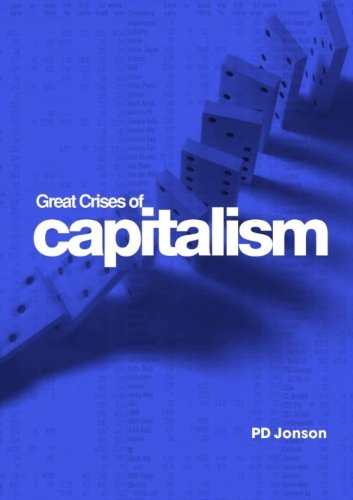Great Crises of capitalism
By Peter Jonson
(Connor Court, 2011, 319 pages)
 It has taken a few years for the global financial crisis that led to Kevin Rudd's essay in The Monthly, blaming neoliberal institutions, to be properly analysed and considered.
It has taken a few years for the global financial crisis that led to Kevin Rudd's essay in The Monthly, blaming neoliberal institutions, to be properly analysed and considered.
In his book, The Great Crises of Capitalism, economist Dr Peter Jonson takes his stab at providing a rich and historically accurate perspective of how this crash fits in with capitalism's long running history of boom and bust, from the Dutch tulip bubble, to the GFC in 2009.
Chapter by chapter Jonson goes through the namesakes of his book, describing the foundations for booms, and then how capitalism always catches up with them, leading to busts.
Importantly, Jonson doesn't fall prey to simply dismiss boom periods and retractions as mere cycles, but highlights that each event is caused by particular circumstances, often created by underlying faults of the deceptively entrepreneurial or worse, government regulation.
The final few chapters are where Jonson provides his own insight and analysis of what lessons can be learned from history.
After all, the uncertainty of capitalism and its dynamic affects are what makes it a desirable system for economic order and growth.
He argues ''despite its obvious imperfections, capitalism is by far the best way to order the world's economic affairs'', but argues against a Rothbardian or Randian libertarian vision of capitalism with virtually no regulation. Instead he argues ''sensible regulations ... are needed if capitalism is to survive and prosper''.
Despite the vagaries of such statements, there would be few free market capitalists who argue that there is no role for some regulation to save capitalism from itself and the exploitative entrepreneurial behaviour of a small group of people; at least because in their misbehaviour, the impact is not just against themselves and those they exploit, but also in the confidence that others have in capitalism's future.
Without wanting to over-simplify his commentary, he argues for a classical liberal framework for the international marketplace where limited government provides economic and contractual certainty. Railing against excessive and impulsive financial and economic regulation, he outlines that governments cannot remove uncertainty.
Similarly, without a level of sensible regulation that limits a capitalists' complete exploitation, it cannot deliver on one of its core benefits over the failures of other economic systems. One of capitalism's continual benefits is its capacity to allow for economic mobility irrespective of the circumstances any human being is born into. Economic mobility has been at the heart of capitalism's strengths and acceptance amongst the general public, even though the staircase can go in different directions.
Jonson also recognises that government has a role to play in society and identifies its capacity to design incentives that influence the behaviour of individuals, from research and development finance, to philanthropy which provides a public and commercial good. The challenge that he partially addresses in designing governance and limitations is where lines are drawn for government influence and power to cease.
But amongst his organically conservative approach to economics, he also proposes ideas that are a radical departure from mainstream thinking resulting from global economic integration. While not historically radical, proposing a transition to a form of ''base money control'', from individual nations setting interest rates, is a challenge to established currencies based on fiat money and state sovereignty.
Jonson argues that a serious crisis may be necessary to get such a decision to be taken seriously, but the European experiment of establishing a regional currency hasn't delivered the benefits expected and is likely to hinder the advancement of his idea.
Finally, Jonson doesn't wholly concede the point that periods of economic downturn are undesirable. Of course downturns aren't beneficial and should be avoided, but they follow periods of spectacular growth and risk, as time series data of economic growth shows, and while some individuals take the pain, most of the benefits remain in place.
For example, while the technology boom of the late 1990s and early 2000s meant many speculative ventures collapsed, computer technology and innovation took an incredible leap that remained and was absorbed within the companies that survived.
In essence, speculative and uncertain growth and collapse are different sides of the same coin and remains the consequence of the incredible benefits of the other. In comparison the alternative is wholly undesirable stagnation.
No comments:
Post a Comment